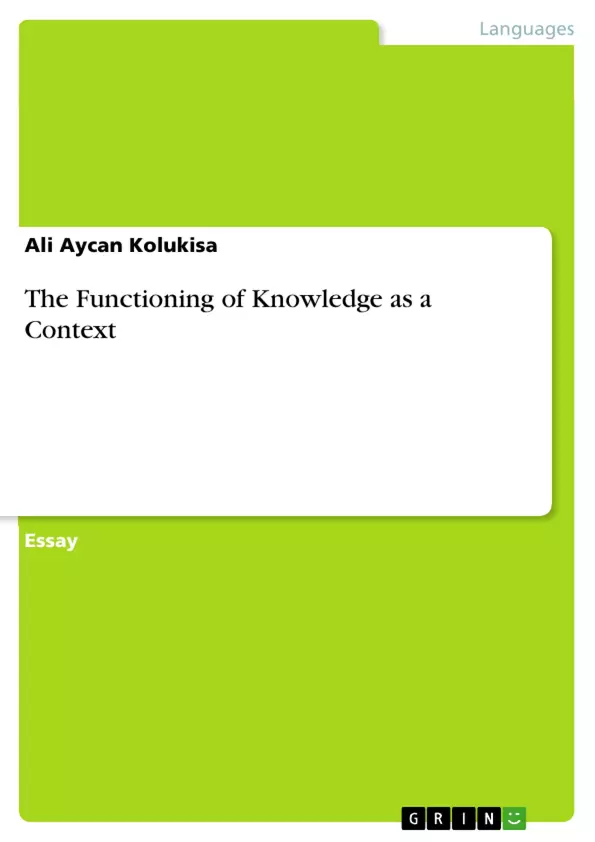According to its characteristics, knowledge is divided into two subgroups named as Universal Knowledge and Individual Knowledge. Universal Knowledge is a kind of knowledge which is same everywhere and does not change according to the people’s understanding wherever you go on earth. On the other hand, Individual Knowledge is the knowledge a person can know, experience or understand, which is not known by large groups of people. After making a distinction between the two types of knowledge, it has been discovered that both the Universal and Individual Knowledge can work as a context at the back of a sentence. However there are some differences between them.
Inhaltsverzeichnis (Table of Contents)
- Introduction
- Knowledge in Cognitive Linguistics
- A Different Approach to Knowledge
- How does the Universal Knowledge function as a Context?
- How does the Individual Knowledge function as a Context?
- Conclusion
Zielsetzung und Themenschwerpunkte (Objectives and Key Themes)
This paper explores the functioning of knowledge as a context in language. It aims to differentiate between Universal Knowledge and Individual Knowledge, proposing a different approach to knowledge than that found in cognitive linguistics. The paper examines how both types of knowledge influence the meaning and connections of words in a sentence, ultimately functioning as a context.
- Universal Knowledge vs. Individual Knowledge
- The role of knowledge in language comprehension
- The influence of knowledge on word meaning and connections
- Knowledge as a context in sentence construction
- Analysis of conditional sentences across languages
Zusammenfassung der Kapitel (Chapter Summaries)
- Introduction: This chapter introduces the concept of knowledge as a fundamental element of human understanding, highlighting the distinction between Universal Knowledge (shared by large groups) and Individual Knowledge (specific to individuals or small groups). It also lays the groundwork for a different approach to knowledge than that found in cognitive linguistics.
- Knowledge in Cognitive Linguistics: This chapter explores the two main aspects of knowledge in cognitive linguistics: dictionary knowledge (referring to the core meaning of a word) and encyclopedic knowledge (encompassing all related meanings and associations). It discusses how these two types of knowledge are interconnected and influence word meaning.
- A Different Approach to Knowledge: This chapter introduces the paper's proposed approach to knowledge, which differs from cognitive linguistics. It defines knowledge as a "sort of commonsense" acquired through learning, experience, perception, and cognition. The chapter also explains the concept of shared knowledge and its impact on reliability and universality.
- How does the Universal Knowledge function as a Context?: This chapter analyzes the role of Universal Knowledge in sentence construction, focusing on conditional sentences in Japanese, English, Turkish, Kyrgyz, and Russian. It demonstrates how shared knowledge influences the meaning and structure of sentences across languages.
Schlüsselwörter (Keywords)
The main keywords and focus topics of this paper include knowledge, Universal Knowledge, Individual Knowledge, cognitive linguistics, encyclopedic knowledge, dictionary knowledge, context, sentence construction, language comprehension, and cross-linguistic analysis.
Frequently Asked Questions
What is the difference between Universal and Individual Knowledge?
Universal Knowledge is shared globally and doesn't change by person (like scientific facts), whereas Individual Knowledge is based on personal experience and is not known by large groups.
How does knowledge act as a context in a sentence?
Knowledge functions as a background that influences how words are connected and understood, providing the necessary framework for language comprehension.
What is "Encyclopedic Knowledge" in cognitive linguistics?
It encompasses all the related meanings, associations, and broader information a person connects with a specific word, going beyond a simple dictionary definition.
How does the paper analyze conditional sentences?
The study compares conditional sentences in languages like Japanese, English, and Turkish to show how shared Universal Knowledge shapes sentence structure across cultures.
What is the "Commonsense" approach to knowledge?
The paper proposes that knowledge is a form of commonsense acquired through learning, perception, and cognition, which serves as a reliable basis for communication.
- Arbeit zitieren
- Ali Aycan Kolukisa (Autor:in), 2015, The Functioning of Knowledge as a Context, München, GRIN Verlag, https://www.hausarbeiten.de/document/299804


